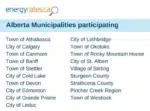Launched in 2021, The Clean Energy Improvement Program is an initiative that allows residential and commercial property owners to pay for energy efficiency and renewable energy upgrades offering them low-cost, flexible, and long-term financing.
The steps to participate, for business and residential places, are similar – with small changes explained below, such as checking if your municipality is participating, reviewing the municipality’s terms and conditions, and submitting a pre-qualification form. Alberta households spend almost $5,000 a year on energy costs, therefore, boosting energy efficiency by improving heating, windows, lights, insulation, and other appliances, these upgrades consequentially could promote lower electricity and natural gas bills.
Is your residence qualified?
The program is available in participating municipalities in Alberta and includes detached and semi-detached homes, townhouses, and low-rise apartment buildings.

To be eligible, you need to be the legal leasehold estate owner of an existing low-rise residential property located in the city and meet all requirements listed in the Terms and Conditions listed in each area.
The residential upgrades would be:
- Doors, windows, insulation, and air sealing.
- Heating, ventilation, and air conditioning.
- Lighting.
- Water heating.
- Solar PV, renewable energy, and thermal.
- Custom upgrades (clean energy upgrades)
The custom upgrades pathway is available in the municipalities:
- Town of Canmore
- City of Cold Lake
- Town of Devon
- City of Edmonton
- City of Grande Prairie
- City of Leduc
- City of Lethbridge
- Town of Okotoks
- Town of Rocky Mountain House
- City of St. Albert
- Town of Stettler
- Village of Stirling
- Strathcona County
- Sturgeon County
- Town of Westlock
Before choosing the upgrades, residents can check the benefits of each improvement checking the program’s website. For energy efficiency windows, for example, they explain that for an average home (assuming a building size of 1,500 square feet and 200 square feet of windows), the annual savings are equal to 12 GJ, for example. In the file above, it is possible to check the estimated annual savings for each upgrade needed.
Commercial property application and upgrades
UPDATE: The City of Edmonton’s Clean Energy Improvement Program for Commercial Property is closed to new pre-qualification submissions but is planned to re-open soon. Programs for commercial property owners are expected to launch in coming years including the City of Grande Prairie and Sturgeon County.
As is required for residents, commercial places also need to fill out a pre-qualification form to inform the property type, tax roll account number, and property secure-debt, besides document submission, as insurance proof and policy number,
For commercial properties, the program is eligible for Non-Residential Properties - business activities, including corporate offices, retail (e.g., stores and restaurants), and accommodations (e.g., hotels); Non designated industrial property used for manufacturing, warehousing, distribution, contractors shops; Special purpose property, built to suit a specific purpose (e.g., church, museum); or Land that is used for farming operations as defined in Alberta’s Matters Relating to Assessment and Taxation Regulation.
Commercial places can benefit from many advantages compared to traditional loans, and the upgrades would be:
- Commercial kitchen.
- Heating, ventilation, and air conditioning.
- Solar PV, renewable energy, and thermal.
- Lighting.
- Water heating.
- Doors, windows, insulation, and air sealing.
- Motors and drivers.
How to find a contractor?
Contractors support property owners with their Clean Energy Improvement Program projects. To find a contractor you only need to go on the directory website page and fill in the areas where the property is located, the services you are looking for, the address, if it is for a residential or commercial place, and other specific information. There you can also find all the participant’s contractors.
The government recommends getting three or more quotes for your project and asking the possible contractor to provide a quote valid for at least two months.
Repayment
The repayment for residential and commercial places is facilitated by a tax added to the property’s tax bill. Moreover, the project financing is tied to the property, not the property owner, which means if the property is sold, the new owner assumes repayment.











